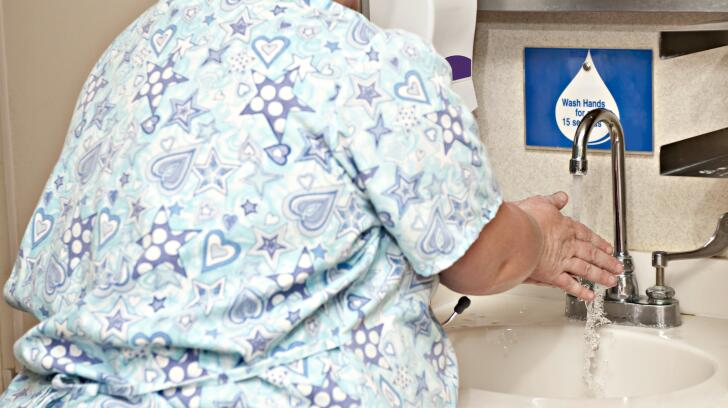Medical error is a problem, but patients can help prevent mistakes.
According to a new study on patient safety, medical error is the third leading cause of death in the United States. More fatal than respiratory disease, accidents, stroke, Alzheimer’s disease, and diabetes, medical errors may cause more than 250,000 deaths a year. Medical errors result from breakdowns in communication, incorrect diagnoses, poor judgment, and incompetence, say researchers. While the overwhelming majority of providers and hospitals make safety a priority, mistakes do happen—but there are steps you can take as a patient to further minimize the risk of medical error.

1. See yourself as a member of your healthcare team.
The most important thing you can do to prevent medical error is to be involved in your care. Studies show that patients who take an active role in their healthcare have better outcomes and overall experiences. Think of yourself as a member of the team: You, the patient, are just as important as your doctors, nurses, surgeons, and other healthcare professionals when it comes to getting you healthy. Engaged patients ask questions and understand the thought behind medication prescriptions and treatment decisions. If you don’t know why your doctor is doing something, don’t be afraid to ask for a clear explanation.

2. Tell your medical team about your medication history.
Before taking any new prescribed medication, make sure your doctors and nurses are aware of any drug allergies you may have, as well as the current medications (and dosages) you take. This list should include prescriptions as well as over-the-counter drugs like eye drops, allergy meds and pain relievers, plus any vitamins and herbal supplements you take. Medications can interact with each other, leading to bad—and potentially dangerous—reactions. If your list is long, write it out beforehand and make copies to keep for future use, or download a smartphone app that stores medical information for easy access. You could even choose a more low-tech route: place all your medications in a bag and bring them with you to your appointment.

3. Make sure everyone involved in your care is on the same page.
Don’t assume everyone on your medical team has all the information. Patient handoffs during hospital care present one of the most common opportunities for medical error, as staff members neglect to communicate all details to the new care team. If your hospital visit includes any shift changes or transfers, make sure the physicians and nurses taking over your care are aware of your medical history and allergies. And if you sense your treatment differs from the original doctor’s orders, don’t be afraid to speak up.

4. Do what you can to avoid infection.
According to the Centers for Disease Control and Prevention (CDC), about one in 25 hospital patients gets at least one healthcare-associated infection. If you’re in a hospital, make sure everyone caring for you has washed his or her hands or is wearing clean gloves. Don’t apologize, demand germ-free hands! If you have a catheter, ask each day if it’s still necessary. Have your doctor explain how you can keep surgical wounds clean. And be aware of the signs and symptoms of infection so you can act quickly should one develop.

5. Stick to the buddy system.
Even if you’re paying close attention, it can be incredibly useful to have another set of eyes and ears when you’re getting information and instructions from your doctor. Take a friend or family member to your appointments to ensure you don’t miss crucial information. If you’re spending time at the hospital, a loved one can make sure you’re getting the care you need, keep an eye on your mental state, and quickly call for help if needed.

6. Confirm the medications and dosages you’re receiving.
About 400,000 medication errors occur each year in the U.S. Before a medication is administered to you through IV, syringe or tablet, ask to see the label and confirm you’re getting the correct medication and dosage. Most hospitals today use barcode scanning systems: Before dispensing medication, a nurse scans the bar codes on the drug label and the patient’s ID bracelet to ensure the right drug goes to the right patient, in the right dose and at the right time. If your hospital doesn’t have this program, speak up and make sure no mistakes are being made.

7. Avoid unnecessary treatments or tests.
If your doctor has ordered a test, make sure you understand why it’s needed and what the results may mean. If he or she recommends a treatment, ask about other potentially less invasive options. You might be better off without a certain test or treatment, so it’s important to understand the reasoning behind your doctor’s decisions.

8. Educate yourself about your condition and treatment.
The more you understand your current situation, the better you can advocate for yourself. Research your condition and find support or discussion groups that may give you more insight. Ask your doctors and nurses for more information, and don’t be afraid to request clarification if things don’t make sense at first. Understand the risks, benefits, and success rates of your treatment and make sure that your doctor’s method is based on the latest evidence.

9. Choose a hospital with a high safety rating.
A hospital needs to run like a well-oiled machine, with each part working efficiently and effectively, in order to ensure the safety of its patients. Keep in mind not all hospitals are the same—where you receive your care matters greatly in terms of successful outcomes and avoiding medical error. Healthgrades offers quality ratings for nearly every hospital in the country, including information about success rates for specific procedures and treatments. Look for a hospital that offers 3-star care or higher, and choose a doctor who has admitting privileges at that hospital.

